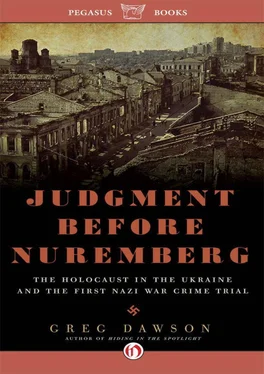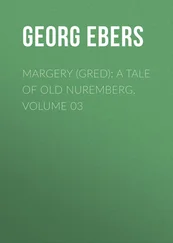The Russians got their wish. The leaders signed a statement on atrocities which sent a chilling message to Germans who had committed, and perhaps were still committing, atrocities—as well as a blunt warning to those without blood on their hands to not even think about it, lest the Allied powers “pursue them to the ends of Earth.” For the Soviets, the key sentence of the Moscow Declaration addressed legal jurisdiction over suspected German war criminals.
“Those German officers and men and members of the Nazi Party who have been responsible for, or have taken a consenting part in, atrocities, massacres and executions will be sent back to the countries in which their abominable deeds were done in order that they may be judged and punished according to the laws of these liberated countries and of the free governments which will be erected therein. Thus, Germans… who have shared in slaughters inflicted on the people in areas of the Soviet Union which are now being swept clear of the enemy will be brought back to the scene of their crimes and judged on the spot by the people whom they have outraged.”
The Soviets wasted no time in exercising their jurisdiction. Less than two months after the Moscow conference, three Nazi officers and a Russian collaborator were brought before the Military Tribunal of the 4th Ukrainian Front in Kharkov, charged with having “taken a direct part in mass and brutal extermination of peaceful Soviet people.” The Western Allies had not expected such trials to occur until after the war, and were deeply concerned the Germans would retaliate with trials of captured U.S. and British airmen. But despite intense gnashing of diplomatic teeth in private, the Allies held their tongues as the trial proceeded. “The Kharkov trial thus became the principal test, right up to the war’s end, of the ability of the three Allies to stand behind the Moscow Declaration,” wrote historian Arieh Kochavi. [6] Arieh Kochavi, “The Moscow Declaration, the Kharkov Trial, and the Question of a Policy on Major War Criminals in the Second World War,” History (October 1991).
The indictment offered by Soviet prosecutors at Kharkov contained themes and principles that would be reprised at Nuremberg, not least a continuum of Nazi guilt in which those who ordered and those who shot were inextricably bound together. “All these crimes and outrages are not isolated facts, but only a link in the long chain of crimes which have been and are being committed by the German invaders on the direct instructions of the German government and the Supreme Command of the German Army,” the indictment stated.
Law professor John Quigley has written, “It was the Soviet Union that, during the war, promoted what was to become perhaps the most significant legal innovation in the Nuremberg proceedings, namely the notion that waging of aggressive war is a crime to which individual responsibility attaches. Soviet representatives proposed the idea to the other Allies, and that is how this crime found its way into the London Charter, which defined the crimes to be tried at Nuremberg.” [7] John Quigley, “Soviet Influences on International Criminal Law in the Nuremberg Era,” review of Moscow’s Road to Nuremberg by George Ginsburgs, Criminal Law Forum (1996), 447–448.
In his indictment at Nuremberg, Jackson said the defendants were guilty of five categories of crimes, including preparation and waging of wars of aggression, and persecution and extermination of Jews and Christians. “The prosecution submits that these five categories of premeditated crimes were not separate and independent phenomena but that all were committed pursuant to a common plan or conspiracy,” Jackson stated. “The central crime in this pattern of crimes, the kingpin which holds them all together, is the plot for aggressive wars.”
The Soviets had a large hand in “defining the legal theories under which the defendants would ultimately be tried,” wrote Bazyler. Their novel idea that governing cliques such as the Nazis could be viewed and prosecuted as criminal organizations was met with resistance by the other powers. “In the end, the Soviet position prevailed, and became an important prosecutorial tool during the trial.” [8] Michael Bazyler, “The Role of the Soviet Union in the International Military Tribunal at Nuremberg and Impact on Its Legacy,” Titel des Artikels , 2.
Molotov’s extensive homework had paid off. Chief Soviet prosecutor R.A. Rudenko and his team may have been the best prepared of the four Allied prosecution teams. They came armed with reams of information and damning evidence meticulously gathered by the Extraordinary State Commission for the past three years. “The Commission’s extraordinary efforts resulted in an impressive list of hundreds of Germans, from generals to humble privates, and a specific and detailed enumeration of the crimes of which they stood accused,” Bazyler wrote. “The Soviet presentation of their case through extensive documentary evidence played a critical role in the thorough documentation of Nazi crimes and exposure to the world of brutality of the Nazi regime.”
Bazyler concludes that “Soviet contributions to the trials were numerous, from their scrupulous gathering of evidence, to the precedents set by their domestic trials of war criminals, to their presentation of the records of massive Nazi atrocities on Soviet and foreign soil alike. Such contributions cannot be underestimated.” [9] Bazyler, “The Role of the Soviet Union in the International Military Tribunal at Nuremberg and Impact on Its Legacy,” Titel des Artikels , 7–8.
Yet they have been. The record strongly suggests that it was the Soviet scholar Trainin, in his 1944 book Criminal Responsibility of the Hitlerites, who first argued that the Nazis at Nuremberg should be charged with a “crime against peace,” which he contended was the gravest international offense. The idea had been batted around in conferences, but “Trainin gave the concept its definitive formulation, which would later serve as a basis for the Nuremberg Charter,” wrote historian Francine Hirsch. Ginsburgs called Trainin’s thinking “revolutionary.” None of that has altered “the common misperception that it was the United States that came up with the formula for ‘crimes against peace,’” Hirsch wrote. [10] Francine Hirsch, “The Soviets at Nuremberg: International Law, Propaganda, and the Making of the Postwar Order,” American Historical Review (June 2008), 707.
What happened? A classic case of history being written by the winners. The IMT was a public-relations proxy battle in the Cold War, and the Soviets lost. As much as we may wish to exalt the trials as an expression of pure and ultimate justice, “Nuremberg was as much about politics as it was about justice—and it could not have been otherwise,” Hirsch wrote. “It was the U.S. that seized control of the IMT and made Nuremberg its own.” [11] Hirsch, “The Soviets at Nuremberg,” 703.
The not-ready-for-prime-time Soviet delegation was mocked for its drab clothing and inept translators. The Western Allies allowed embarrassing information about Soviet actions not related to the Nazis’ crimes—e.g., the Soviet-German Non-Aggression Pact of 1939 and the murder of Polish officers in the Katyn Forest—to be raised in court by defense attorneys for the Germans.
“The IMT became a devastating propaganda failure for the Soviet ‘propaganda state,’” Hirsch wrote. “It exposed Soviet inadequacies before the world and ultimately shaped Soviet leaders’ attitudes toward the postwar order.” As for the Soviets’ many important contributions to the IMT process, “These would soon be forgotten in the West—a direct result of the Cold War.” [12] Hirsch, “The Soviets at Nuremberg,” 710.
Читать дальше












